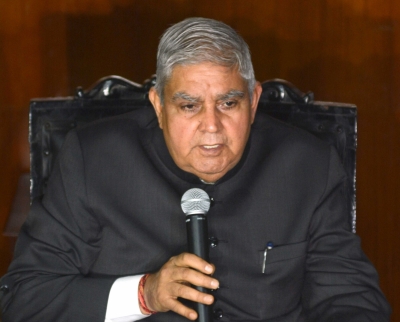By Archana SharmaJaipur, Jan 11 : At the 83rd conference of All India Presiding Officers being held in Jaipur, Vice President Jagdeep Dhankhar, Lok Sabha Speaker Om Birla and Rajasthan Chief Minister Ashok Gehlot discussed the challenges of judicial interference in legislative proceedings.They also called for decorum amongst the MPs and MLAs while running the House.
The Vice President expressed his displeasure over the cancellation of law by the Supreme Court which was passed by Parliament.
Dhankhar said that in 1973 a very wrong tradition started.
“It was in 1973, in the Kesavananda Bharati case, that the Supreme Court evolved for the first time the right of the courts to strike down constitutional amendments that violated what it called the ‘Basic Structure’, or the fundamental architecture of the Constitution.Power of the Parliament to amend the constitution and deal with legislation is not subject to any other authority.This is the lifeline of democracy.I am sure this will engage your thoughtful consideration,” he said.
“I want to say with respect to the court that I do not agree with this, the House can make changes.This House should tell whether it can be done,” he stated.
Dhankhar said “When I took charge as the Chairman of the Rajya Sabha, I had said that neither the executive can see the law, nor the court can interfere.If any institution invalidates the law made by Parliament on any ground, then it will not be good for democracy.It would be difficult to say that we are a democratic country.”
He added that in subsequent years, the highest court delivered significant rulings on matters that it held pivotal to this “Basic Structure” and in the process parliamentary sovereignty was compromised.The most recent and prominent judicial manifestation of the “basic structure doctrine” was on 16th October, 2015, when the highest court of the land in a 4-1 majority verdict, held both the 99th Constitution Amendment Act, 2014, and the National Judicial Appointments Commission (NJAC) Act, 2014, unconstitutional on the premise of being in violation of the basic structure.
History of sorts was created in Parliament with respect to the NJAC as there was complete unanimity in the Lok Sabha.There was not a single dissenting voice.The House voted in unison in favour of this constitutional amendment.
In the Rajya Sabha, there was unanimity but there was one abstention.Sixteen state legislatures ratified it, with the Rajasthan Assembly being the first one.This exercise crystallised into a constitutional prescription with the President’s assent under Article 111 of the Constitution.
This was undone by the judiciary.
Such a scenario is perhaps unparalleled in the democratic history of the world.The executive is ordained to be in compliance of the constitutional prescription emanating from Parliament.
It was obligated to adhere to the NJAC.A judicial verdict cannot run it down.
Parliamentary sovereignty and autonomy cannot be permitted to be qualified or compromised as it is quintessential to the survival of democracy, he added.
The judiciary cannot legislate in as much as the Legislature cannot script a judicial verdict, he said.
It must be remembered that the Constitution never envisaged a Third and Superior Chamber for Parliament to grant approval to the legislation passed by the two Houses.
He also raised concerns about the conduct of the elected representatives and said, “The current scenario in Parliament and the Legislatures is indeed a cause of concern.
It is time for us to address the widespread disillusionment and disgust of the people at the lack of decorum in Parliament and the Legislatures.Be in no doubt, the anguish and disappointment of the people at the lack of decorum and discipline in the proceedings in Parliament and the Legislatures is severe.
There is continual diminishing of respect in the public for Parliament and the Legislatures and their representatives.There could not be more urgency for being in correctional mode.
How can the representatives — MLAs, MLCs and MPs — swear by the constitution and the law but blatantly flout the rules and throw decorum to the winds, he questioned.
Lok Sabha Speaker Om Birla said the judiciary should also follow decorum.
The judiciary is expected to use what is constitutionally given to it, and also maintain a balance of power.
Chief Minister Ashok Gehlot said sometimes there are differences with the judiciary which is interfering in our work.
The princes’ privy purses were abolished by late prime minister Indira Gandhi, however the judiciary quashed those orders.Later, judgments came in favour of all her decisions for nationalization of banks.
Gehlot termed Assembly speaker CP Joshi as a revolutionary leader and said that “Running the House in front of the Speaker is a big challenge.Maintaining a balance between the government and the opposition and maintaining your credibility is a big challenge.”
Speaker of the Vidhan Sabha CP Joshi said today there are many challenges in front of parliamentary democracy.Today there is dictatorship of the executive.
Meetings of the Vidhan Sabhas are decreasing, so who will make the government accountable.
If there is no discussion in Parliament and the Assemblies, they will become irrelevant, adding that the assembly speaker is helpless.”The speaker of the assembly is only the referee.The speaker cannot call the assembly.This work is done by the government.Unfortunately, we only run Houses.There is no other power.I want to tell the CM that the Legislature should be given the right to take financial decisions,” he added.
The All India Presiding Officers’ Conference is being held in the Rajasthan Legislative Assembly for two days from Wednesday.Speakers of the Vidhan Sabhas and Vidhan Parishads of the country are participating and discussing issues ranging from G-20 to preventing conflicts between the legislature and the judiciary.
arc/bg
#Judiciary #legislate #Legislature #script #judicial #verdict #Indira Gandhi #Jagdeep # Ashok #Archana #Nanda # Archana #Jan #Jaipur #Rajasthan #Jaipur #Birla #Democratic
.






